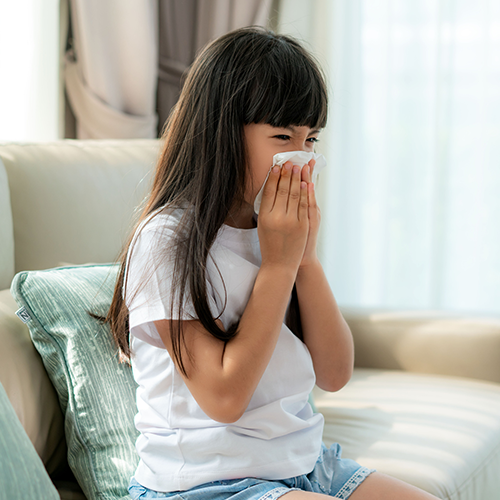If your child is suffering from itchy eyes, a runny nose and cough during the winter – they may have indoor allergies. Indoor allergens like mold, pets and dust can be an issue all year long, but you might notice them more during colder months as kids spend more time inside at home and school.
Dr. Gigi Chawla, chief of general pediatrics at Children’s Minnesota, is providing tips to manage indoor winter allergies.
Does cleaning manage common indoor winter allergies?
It may seem simple, but cleaning the house is one of the easiest ways to deal with indoor winter allergies! Dust, mold, pet dander and dust mites can hide anywhere and cause sneezing, coughing and congestion.

To help, keep a regular cleaning schedule. Dust and vacuum frequently, especially under and behind furniture, where allergens can easily build up. Wipe down counters and other surfaces that you use often.
Managing dust mites
Dust mites live and multiply in warm, humid places and are often found in pillows, mattresses, carpeting and upholstered furniture. Even if your home is visibly clean, dust mite allergen particles are too small to be seen.
If your child has allergies, here are some tips to manage dust mites:
- Use mite-proof zippered cases for your mattress and pillows to limit your exposure to dust mites.
- Every week, wash and change your sheets, blankets and other bedding in hot water to eliminate any lingering dust mite droppings.
- Replace your pillows every 2-3 years.
How can I manage pet allergies?
It’s not easy to balance your child’s love for their dog or cat if they have a mild pet allergy. Just like us, our pets spend more time indoors in winter, increasing your child’s exposure to pet dander and saliva. Here are tips to manage mild pet allergies:
- Keeping pets out of your child’s bedroom will help with any allergies they experience at night that can hurt their sleep.
- During the day, keep your child’s bedroom door closed.
- Groom your pets regularly to reduce indoor air allergies.
What to do if you suspect your child has an allergy
If you suspect your child may have an allergy, it is very important that you talk to your pediatrician. They can work with you to make sure that your child’s allergy or allergies are correctly diagnosed, and the symptoms properly treated.
Dr. Chawla on WCCO
Dr. Chawla shares tips for managing indoor winter allergies on WCCO.